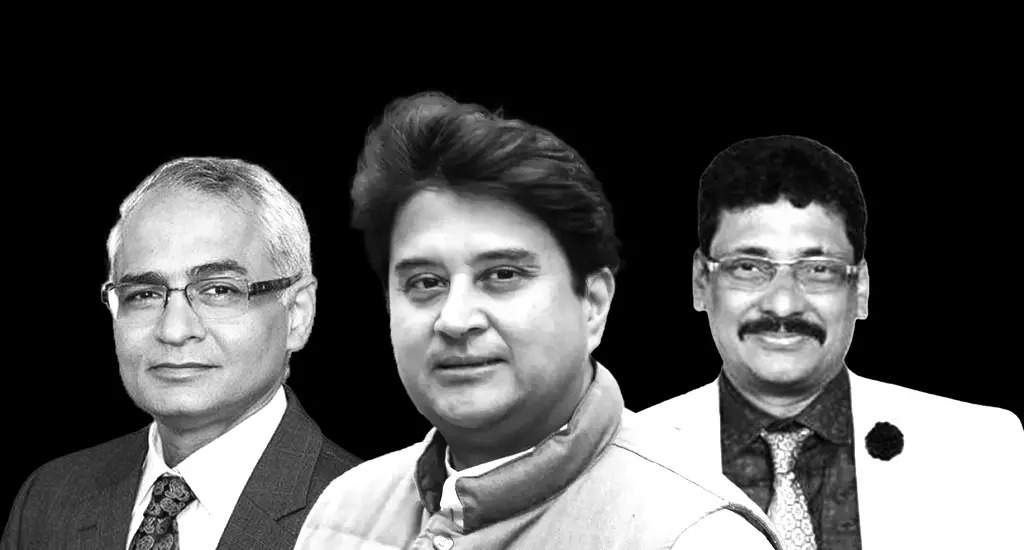
NEW DELHI: The Centre’s ambitious digital connectivity program, BharatNet 3—now revamped with an outlay of ₹1.39 lakh crore—is facing serious allegations of ‘selective action’ by local companies. These claims threaten to drag the initiative, aimed at connecting 6.5 lakh villages, into courtroom battles.
State-run Bharat Sanchar Nigam Limited (BSNL) said that the tender evaluation was done transparently, and the initiative is on track, while defending the recent developments.
The discontented bidders, however, are accusing BSNL otherwise.
Several complaints were made to the Ministry of Communications over the course of the last few months, including a few shared anonymously.
In a five-page letter, dated February 24, 2025, addressed to the Minister of Communications Jyothiraditya Scindia, a complainant said, “it appears that BSNL has failed to check the lack of primary basic eligibility of bidding parties in accordance with standard procedural norms.”
Queries to the Ministry of Communications did not elicit any response.
BharatNet 3, a follow-on phase of the Prime Minister Narendra Modi’s prestigious program, is fully funded by the Digital Bharat Nidhi (DBN) erstwhile Universal Service Obligation Fund (USOF).
BSNL, as a part of pre-bid discussions, had to issue as many as 4,400 clarifications to queries from bidders in May 2024. It also prompted scepticism leaving behind legal loopholes wide open.
PSU bias
Sources say that while a Bangaluru-based ITI Limited won a package making a relatively smaller firm as a consortium partner, while on the other hand, Assam package awarded to another state-run Telecommunication Consultants India Limited (TCIL), based on ‘suo moto’ action, citing vendor-selection deviation, is withheld.
Interestingly, the ITI-led consortium received a go-ahead from the DoT’s Chief Vigilance Office (CVO) within 48 hours when irregularities in selecting consortium partners were brought to its notice.
Meanwhile, the vigilance officer in its remarks said that upon examination, it “did not find prime facie allegations true and due diligence seems to have done” in the process of selection of consortium partner.
Query to ITI did not receive any response.
Of the overall 16 packages, six were released in the first tranche, including lucrative ones – Uttar Pradesh East and West – won by a public sector Rail Vikas Nigam Limited (RVNL).
Legal tangle
On March 10, a Delhi-based company sought cancellation of Haryana package awarded to a lowest bidder citing misrepresentation. It escalated into a bitter spat, with the other side blaming technical flaws on BSNL’s part while evaluating the former’s bid.
State-owned telco, to steer away controversy, sought a ‘legal view’ from the Additional Solicitor General (ASG) of India N Venkataraman who on March 12, opined cancelling three packages — Rajasthan, Haryana and Northeast region.
The matter took a twist when a legal heavyweight and former Chief Justice of India DY Chandrachud and a former Supreme Court justice AK Sikri weighed in, and strongly contradicted ASG views that put BSNL in a fix. The issue is now back on Venkataraman’s table for a review.
While the state-owned telco is yet to take a considered view upon receiving a revised opinion, BSNL insiders say that they ‘have instructions from the top to cancel at least four packages.’
Clarifications to ‘an extent of substantial modification in eligibility requirement,’ enabling disqualification of an otherwise lowest bidder, is not acceptable, said legal experts.
Query to ASG of India remained unanswered.
“Despite this clarity, some PSUs continue to take cognisance of anonymous complaints selectively, raising concerns about arbitrary application of vigilance norms. This selective approach defeats the very purpose of the DoPT and CVC notifications, as it allows certain complaints to be used to stall projects or target individuals while ignoring similar issues elsewhere. Such inconsistent action contradicts the principles of transparency and fairness enshrined under Article 14 of the Constitution of India,” Sonam Chandwani, Managing Partner, KS Legal & Associates said.
BSNL defense
Those who received purchase orders (PO) from state-driven telco includes NCC Limited, ITI-Tera Software, RVNL-HFCL, Polycab and Sterlite Technologies.
“The complaints received during the evaluation stage were examined thoroughly. In a few cases, complaints were escalated to secondary review Committees for an additional layer of scrutiny. Wherever necessary, the documents submitted by the bidder, and were also verified directly from the source. Financial bids were opened only after all technical evaluations were completed and supporting documents were duly verified. The entire bid evaluation process was carried out in a transparent manner, fully in line with applicable rules and procedures,” BSNL chairman A Robert J Ravi told ETTelecom.
Further, Ravi said that the telco adopted a rigorous and transparent evaluation methodology, by instituting sixteen committees—each responsible for one specific package. “All the committees had at least one external member from academia. The committees assessed the bids strictly as per the eligibility criteria defined in the tender and the documents submitted by bidders.”
BharatNet’s troubled history
The project, executed by state-owned telco under the ‘administrative control’ of the Ministry of Communications, was relaunched in January 2024 with a ring topology design. Initially envisioned in 2011 under the UPA-II regime as the National Optical Fibre Network (NOFN), it was rebranded as BharatNet in 2015. Despite multiple extensions, it continues to face execution hurdles.
In July 2022, the Cabinet approved the merger of Bharat Broadband Network Limited (BBNL) with BSNL to accelerate project rollout. In August 2023, the Centre approved the Amended BharatNet Program (ABP) to expand fibre connectivity to the remaining 3.8 lakh non-Gram Panchayat villages on a demand basis.
Bidders are mandated to deploy an IP-MPLS (Multi-Protocol Label Switching) network, with hot-swappable routers at the block level. They are also responsible for 10 years of operations and maintenance, including monitoring uptime through a centralized Network Operating Centre (CNOC), as per strict Service Level Agreements (SLAs).


